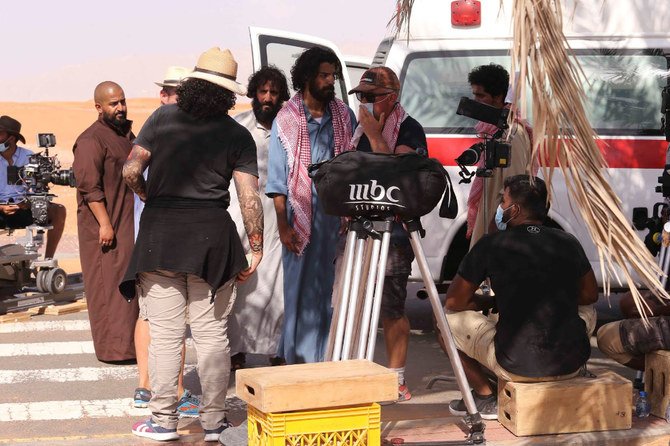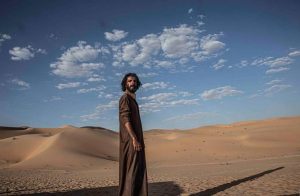
- ARAB NEWS
- 02 Jul 2025

RIYADH: These are exciting times for Saudi Arabia’s film industry. Within the past fortnight, the Saudi Film Festival concluded in Dhahran, the Saudi-Japanese animation “The Journey” had its cinematic release and a “Saudi Film Night” was held at the Arab World Institute in Paris.
These events represent a significant departure from just a few years ago, when there was little or no film production or distribution industry to speak of in the Kingdom.
Behind this change are a number of factors, chief among which is the emergence of young talent, as ambitious Saudi filmmakers take advantage of the opportunities presented by this new era.
“I wouldn’t say it’s easy or hard to break into the film industry,” Sara Al-Munef, a young film director whose short feature “2020 Faces” screened at the Saudi Film Festival, told Arab News.

“We are being given all the chances: The festivals offer a platform for us to screen our films and to enter competitions with millions in prize money. Many companies are involved in financing new film projects.
“It makes no difference whether you are a man or a woman; now it’s just up to me to deliver something that will be appreciated.”
The market for quality film content is being driven in Saudi Arabia by the opening of new cinema theaters along with the mushrooming of global streaming services such as Netflix and its Gulf equivalent, Shahid VIP. This in turn is generating significant investment in the Kingdom’s film sector.
One such deal was the March 2020 purchase by Netflix of “Masameer: The Movie” following the success of the highly popular YouTube series.
Produced by leading Saudi animation studio Myrkott, the series and film depicts the adventures of Dana, a Saudi girl who attempts to improve the world through robotics and artificial intelligence. The film is now being globally streamed by Netflix in more than 30 languages.

Further investment is coming from Spain-based producer Minimo VFX (co-producer of “The Dark Knight,” “Avatar” and the “Harry Potter” franchise), which recently unveiled plans to invest no less than $250 million in the Kingdom via a joint venture with local partner Saudi Next Level Co.
Their stated goal is to produce localized content while providing high-level training to aspiring film professionals.
Closer to home, Dubai–based MBC is actively backing Saudi content for its online streaming subsidiary Shahid VIP — one example being “Rashash,” a serialized drama with an all-Saudi cast, based on the true–life 1980s criminal of the same name, and the efforts by Saudi police to bring him to justice.
The series was conceived by Tony Jordan, a screenwriter of the long–running UK soap opera “EastEnders” with support from Sheikha Suha Al-Khalifa, and directed by Colin Teague, known for TV serials “Doctor Who” and “Jekyll and Hyde.”

Perhaps the most significant recent breakthrough is “The Journey,” a full-length animated feature film depicting the siege of Makkah by an Ethiopian army in pre–Islamic times. The movie was co-produced by Riyadh–based Manga Productions and TOEI Animation of Japan.
“We wanted to work with TOEI Animation because they are very well known and popular both in the region and across the world,” Abdul Aziz Al-Nagmoosh, director of marketing and distribution at Manga Productions, told Arab News.
“We collaborated with them on the children’s TV show ‘Future Folk Tales’ and then on ‘The Journey.’ We financed the training of about 300 Saudi animators over the past four years, both in Japan and the US. They also had work experience in both those countries and gained skills in production, direction, art direction and even marketing. Then we hired a number of them to work on our projects.”

Manga Productions is a subsidiary of Misk Foundation, which was established by Saudi Arabia’s Crown Prince Mohammed bin Salman in 2011 with the aim of empowering the youth of Saudi Arabia in three main areas: Education and entrepreneurship; culture and creative arts; and science and technology.
Commercial projects such as “The Journey” demonstrate the wider effort to diversify the national economy away from its current focus on the oil sector. Another indication of this strategy is the positioning of the AlUla historical district as an exotically beautiful film location.
The Hollywood feature “Cherry” — directed by Antony and Joe Russo of “Captain America” and “Avengers” fame — was shot in AlUla in 2020.
Film AlUla — working in coordination with the Saudi Film Commission and the Ministry of Culture — now provides an entire film-production ecosystem, with a range of skilled professionals and production services on hand. The act of shooting a film in the Kingdom has become a lot simpler as well.

Speaking to Arab News, Fahad Al-Otaibi, a producer and director of TV commercials and short films, said: “Getting permission to shoot is way easier than before. You used to have to get a lot of different permissions, but now it’s all online and it only takes three to five days.”
All of this reflects the growing perception — in both public and private spheres — of the media and entertainment industry as a key growth area for the country, driven as it is by the almost universal adoption of smartphones and social media across the Saudi population.
As Al-Nagmoosh puts it, “most Saudis are online most of the time, which is why there will be a focus on movies made for streaming services as opposed to theatrical releases. And that is a shift that is taking place worldwide.”
Indeed, online streaming is opening up possibilities that were never previously available to independent producers and directors lacking the financial and marketing clout of global corporations.

Al-Otaibi said: “Online platforms such as Netflix are changing the game because they have such a big reach. It can enable a low-budget Saudi film to potentially be a huge international hit. I think we have a better chance with that than we do with cinema distribution.”
He added: “Nobody would have believed seven years ago what is being achieved today, and I’m sure we can’t even imagine how it’s going to be three years from now. You don’t need $100 million to produce the next ‘Friends’ — you need a very good team, a very good story and a very good vision.”
The general consensus of industry hands is that what is needed is time. Saudi Arabia “has to prove itself with its films before it becomes integrated with the global media and entertainment industry — it took South Korea decades of hard work before ‘Parasite’ won the Oscar,” Al-Otaibi told Arab News.
“We need time, we need to try hard, we need to be patient, we need to invest and we need to learn — that’s what’s got to happen over the next 10 years.”
For his part, Al-Nagmoosh of Manga Productions said: “We haven’t had any major box office hits yet, but with the new focus of the government and new relationships being formed across the world, I think we’ll see a huge increase in production in Saudi Arabia over the next five years.”

The key word for now is “patience.” If there is one message young Saudi filmmakers wish to convey to potential investors, it is that film production is not a rapid-profit, quick-turnaround business.
A full-length feature film can require several years from conception to release, and rushing that process could undermine the quality of the final product.
But with the opening of hundreds of cinemas across the Kingdom, active government support, ample public and private funds, new distribution channels and a talented and ambitious cadre of young filmmakers, the future is looking bright for Saudi Arabia’s film industry.
From being a distant outlier, it appears not long before Saudi Arabia becomes a major player in this sector.